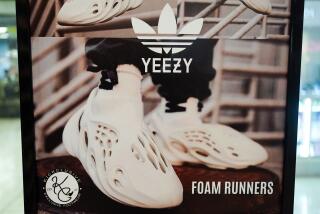Giant strides taken in China
- Share via
The Beijing Olympics are less than a year away, and one of the hottest races shaping up is not among the athletes but the companies that outfit them.
China is one of the largest emerging markets and a top focus for shoemakers fighting for market share. And as the 2008 Beijing Olympics approach, the intensity is reaching a new high.
“The Beijing 2008 Games are set to be the greatest sporting event in modern Chinese history,” said Paul Pi, head of marketing for Adidas in greater China.
Adidas is an official sponsor of the Olympics. In addition to paying a reported $80 million for the sponsorship position, the company has coordinated a marketing blitz that includes opening an average of two stores a day in the country.
The German company has declared that the event will help put it in the No. 1 position in China by 2008, a coveted spot now held by shoe giant Nike.
Nike says China is poised to become its second-largest market after the U.S. by 2009. The company has seen tremendous gains there; its fiscal first-quarter earnings reported in September show sales in China jumped 50%. And Nike executives say the company is widening its lead there.
“The Chinese marketplace is the most exciting marketplace in the world,” said Nike Brand President Charlie Denson.
Nike declined to discuss its Olympics marketing plan but says the Olympic Games are less about advertising than about supporting the athlete.
The company is sponsoring 22 of the 28 competing Chinese federations. And it has one of China’s hottest athletes, hurdler Liu Xiang, wearing its gear.
Both companies may hit $1 billion in annual sales in China by the Olympics, said Terry Rhoades, managing director of Zou Marketing, a consultant company in Shanghai.
In third is Chinese company Li Ning -- a premium local brand but a fraction of the size of its international competitors. Analysts say Li Ning has a different strength, with its base in the smaller and less urban markets where brands like Adidas and Nike have not spread.
Li Ning, founded by a former Chinese gymnast, also has ramped up its design team and is sponsoring several Chinese teams expected to be strong contenders in the games.
But shoemakers say the race isn’t over when the medals are handed out. Denson says the years following the Olympics may be even more exciting than this growth period.
It’s a sentiment shared by both shoe giants.
The games will represent a “real, tangible sea change in attitudes toward sport in China,” Pi said, by spreading a growing trend of interest in athletics and the athletic lifestyle.
Sports were once seen as a luxury in China. But as the middle class has grown and culture has changed, interest has exploded.
Parks and other facilities are being built and opening up to the public. Basketball has become a top sport, and viewers can watch several NBA games a week in China’s major cities.
Companies like Nike and Adidas, which have had a presence in the country for decades, have helped spur the growth with sponsorship of teams and tournaments. Nike has made serious community inroads in China, such as investing in Dong Dan Park in Beijing, the equivalent of draping a major city park with its trademark swoosh symbol.
Nike, Adidas and other shoe brands have blanketed key cities in China with stores. Nike and Adidas have about 3,000 stores each in China and have aggressive growth plans.
“Can the shoe wars be determined by the Olympics?” Rhoades asked. “No, but it’s one more battle.”
More to Read
Go beyond the scoreboard
Get the latest on L.A.'s teams in the daily Sports Report newsletter.
You may occasionally receive promotional content from the Los Angeles Times.







